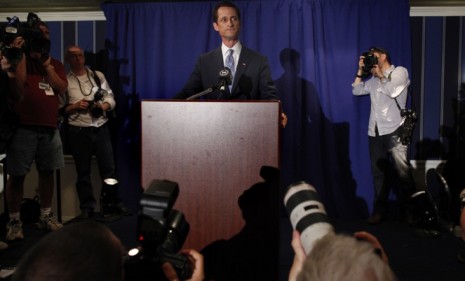When did America begin its 'decadent' decline? 4 theories
The Washington Post's E.J. Dionne says America has conclusively begun to rot with "Weinergate." Others peg earlier events as our point of no return

A free daily email with the biggest news stories of the day – and the best features from TheWeek.com
You are now subscribed
Your newsletter sign-up was successful
"At what point do we decide that a political system has become decadent?" asks Washington Post columnist E.J. Dionne. For Dionne, America lost its last shreds of dignity and restraint a la ancient Rome during the media "circus" over Rep. Anthony Weiner's (D-N.Y.) sexting scandal. Others believe our tipping point came earlier. Here, four alternate events that signaled our point of no return:
1. The outsourcing spree (1990s)
"Americans' addiction to entertainment," be it sex scandals or reality TV, is our version of the "bread and circuses" that lulled underworked Romans into decline, says Alice Schroeder at Bloomberg News. And America's debilitating "debauchery" is directly tied to the "draconian" outsourcing of manufacturing jobs that surged in the 1990s. We became a nation of servers, not makers. Sure, for a while we can use our dwindling paychecks to buy the cheaper TVs and laptops we import. But soon we'll buy ourselves out of jobs, like the Romans did. Getting "sacked by Visigoths" won't be far behind.
The Week
Escape your echo chamber. Get the facts behind the news, plus analysis from multiple perspectives.

Sign up for The Week's Free Newsletters
From our morning news briefing to a weekly Good News Newsletter, get the best of The Week delivered directly to your inbox.
From our morning news briefing to a weekly Good News Newsletter, get the best of The Week delivered directly to your inbox.
"The danger of living on bread and circuses"
2. Bush v. Gore (2000)
If America is broken, "I heard my first unmistakable crack a bit more than 10 years ago, when a colossally corrupt U.S. Supreme Court" threw the 2000 election to George W. Bush in an "ineffably dimwitted" ruling, says P.M. Carpenter at his blog. U.S. elections have been stolen before, but this particular chicanery ushered in eight years of lawlessness, self-destructive military adventures, torture, horrific and costly financial recklessness, and other awful transgressions. We long ago hit our "point of no return," and I'm really "supposed to be upset by Anthony Weiner's cyberboners?"
"Deciding our point of no return"
A free daily email with the biggest news stories of the day – and the best features from TheWeek.com
3. The last Bush years (2006-2008)
I can't pin down the exact moment when we became "late imperial Rome," says Andrew Sullivan at The Daily Beast. But to me it came at some point between "Congress' assent to torture in 2006" — when we abandoned so many of our long-valued principles — and "when Sarah Palin was selected as a serious vice-presidential nominee in 2008." It's been downhill ever since.
4. The Great Recession (2008)
There are lots of reasons "America in 2011 is Rome in 200 AD or Britain on the eve of the first world war" — in other words, an "empire at the zenith of its power but with cracks beginning to show," says Larry Elliott at The Guardian. Most of them have to do with money or America's "advanced state of cultural decadence." Or both, as with the main cause of America's slow collapse: The housing boom, and the subsequent spectacular bust. As previous empires show, "it is hard to stop the rot once it has set in," and China's already gunning to be the next great empire.